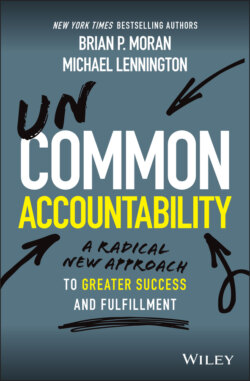Читать книгу Uncommon Accountability - Michael Lennington - Страница 7
ACCOUNTABLE
Оглавление1 Subject to giving an account: ANSWERABLE… held her accountable for the damage
2 Capable of being explained: EXPLAINABLE… leaving aside variations accountable as printer errors… – Peter Shaw
Examples of accountable in a sentence:
If anything goes wrong, I will hold you personally accountable!
The owner was held accountable for his dog's biting of the child.
Did you notice the hidden assumption evident in each example and definition?
Each one was negative: damage, errors, goes wrong, dog's biting! Further, three of the four examples included the application of negative consequences to a performer from some unnamed external power or authority. In those examples, one person with authority blames and punishes another person who lacks authority. The authority is active, the person being punished is passive. Accountability as defined above is profoundly asymmetrical.
There were no mentions of the benefits of accountability. No description of personal growth. Nothing about accountability's life‐changing power. If you believe the dictionary definitions, you would think that people wanting to take more accountability must first become masochistic. Success, according to Webster's, requires punishment!
This traditional view of accountability as punishment creates a power dynamic where authorities seek to assign blame and performers seek to shift it. Accountability in this traditional view is something to be avoided when possible. Further, a person with authority places blame based on the implicit assumption that the performer intended to make a mistake or to fall short. What a mess! It's no wonder so many people avoid this view of accountability.
Creating consequences for people when they don't do what you want them to do is not accountability, it's consequence management. Yes, consequences shape behavior but you will never get discretionary effort with negative consequences. You simply get just enough to stop the consequences, and it comes with collateral damage, from passive resistance to outright sabotage. Ultimately, we choose our consequences in life by the choices we make every day.
There is another definition of accountability, one that isn't in the dictionary. It is a definition that many people naturally understand and gravitate toward. In this intuitive understanding, personal accountability isn't about negative consequences for poor performance, it's about taking personal ownership of one's state in life. This view of accountability is the foundation of this book.
We either walk our own personal path toward greater accountability, or we don't. No one else can hold us accountable, only we can hold ourselves accountable. In fact, looking for someone else to hold you accountable may be the most unaccountable thing that you can do.
True accountability is based on the realization that we all have free‐will choice. By the way, if you think that free will is an illusion and that it does not exist, you are free to hold that belief! For the rest of us who think that we actually do have choices in life, this realization is earth‐shattering. If we believe that we “have to” do things, those things naturally become a burden. When we “have to” do something, we feel trapped, coerced into doing things that others want us to do. Life lived with a have‐to mindset can begin to feel like a prison.
As soon as we realize that everything is a choice, the prison walls disappear. When we choose to do something rather than have to, we have a greater sense of personal control and freedom. Obviously, consequences come with every choice. When you take an action (or avoid taking one), you are also choosing the consequences of that action. It's not that consequences are not a part of accountability, it's just that if you are accountable, you see them differently. You realize that you choose your consequences in life.
